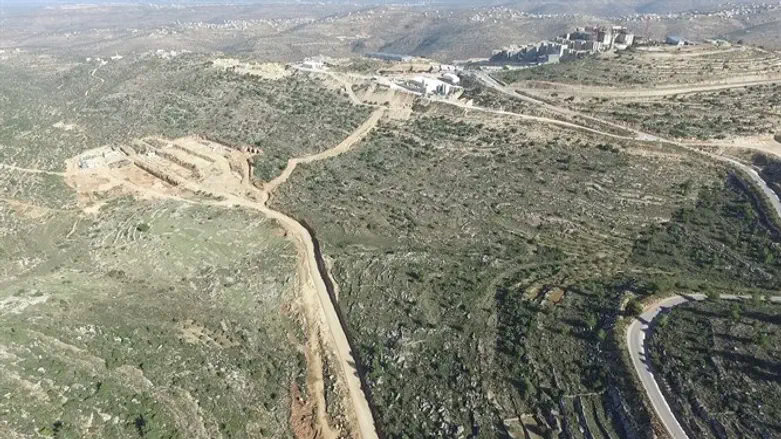
A current of political change for Israel is in the air. The moribund "two-state solution," that Prime Minister Netanyahu solemnly and routinely voices, and which the Republican Party has now ignored, can be transcended now by considering new thought and discourse.
Israeli Sovereignty
The justification for Israel formally annexing Judea and Samaria – as was done for East Jerusalem and the Golan Heights – is compelling: the right of an ancient people to the territorial core of its homeland; defending a narrow coastal plain from attack; and denying the emergence of an irredentist Islamic entity from threatening the very existence of Israel.
The imposition of Israeli sovereignty throughout Judea and Samaria, perhaps in stages, would however be a political game-changer evoking deleterious ramifications: domestically, grave dissension between Jewish segments of the population; internally, violent Palestinian resistance; regionally, Arab threats to actively oppose the decision; and internationally, condemnation of Israel and threatened sanctions for violating its legal obligation to negotiate with the Palestine Liberation Organization.
The inconclusive nature of the existing situation could yet prod Israel, while battered with interminable demands to implement a 'two state solution', to initiate a bold new political démarche.
Two Arab Responses
An Israeli policy to annex the territories will place a formidable dilemma before the Palestinian population. The Palestinians can cull from their collective past two models of behavior. Not all Palestinians will take the same road.
1. Following Israel's War of Liberation in 1948, approximately 150,000 Arabs remained within the Jewish state's territory. They were granted citizenship from the state whose founding they abhorred and against which they fought, while enjoying the right to preserve their linguistic, religious, and national identity. The local Arab enemy has since expanded its domain of liberties and opportunities, crystallized its Palestinian ethos, and amplified its Islamic militancy. Israel's democracy opened the doors of society and politics to those who continue to deny the legitimacy of a Jewish state.
Here is a living and buoyant precedent for the Arabs of Judea and Samaria. They can demand or accept Israeli citizenship or residence status. They will benefit from a stable polity and a prosperous economy, sustain the components of their identity, without abandoning the vision – like their brothers and sisters within pre-'67 Green Line – of turning Israel into a bi-national Jewish-Arab state. This means the death of Zionism and Israel.
Israel will rule from the sea to the river, and the Arabs from within will work to implode the Jewish state by demographic growth and geographic expansion into Jewish cities and neighborhoods. Palestinian terrorism and subversion will undermine Jewish security.
Among Palestinians who have promoted the equation of Israeli annexation with Palestinian citizenship is Sari Nusseibh, president of the Al-Quds University, who considered second-class Arab citizenship in one state a more pragmatic solution than the 'two-state' one.
Azmi Beshara, former Arab member of the Israeli Knesset, advocated the return of Palestinian refugees to Israel and the de-colonization of the Jewish state. His agenda was to transform the country into a state "for all citizens" – thus shattering Jewish statehood.
Survey polls have already recorded that half of the Arab residents of East Jerusalem favor Israeli rule/statehood with its openness and opportunity over Palestinian rule/statehood with its penchant for corruption and economic stagnation. It is this Palestinian choice across the broad sweep of the territories which could overtime dilute the integrity of Israel, producing the flight of the Israelis from the country.
Israeli figures from the Likud and Bayit Yehudi parties promote the formula of annexation-and-citizenship with gusto and the confidence reserved for prophets, but the historical end-point will not be as they foresee. Brandishing slogans of human rights and citizen rights, minority rights and national rights, the Palestinian struggle will use and abuse democracy to try and extinguish the Jewish nation-state.
2. In the throes of the 1947 Arab-instigated fighting, and the resultant full-scale war that erupted with Israel's founding in 1948, over half a million Arabs were displaced from home and country. Most panicked and fled. The Hashemite Kingdom of Jordan, having occupied the "West Bank" (Judea and Samaria), absorbed a sizable number of Palestinian refugees, many of whom proceeded across the river to Amman, e-Salt, Zarqa, and other Jordanian cities.
Arab migration from the "West Bank" eastward proved to be a conspicuous demographic movement. An estimated 200,000 people took this route during Jordanian rule from 1948-1967. The events of the Six Day War in June 1967 and subsequently witnessed another 200,000 moving to Jordan. By 1974, under Israeli rule, approximately 140,000 Arabs chose to migrate to Jordan and emigrate further to the Persian Gulf countries, Europe, North and South America.
The Oslo Accord of 1993 and the establishment of the Palestinian Authority failed to bolster confidence in the economic and political future in the territories.
In 2006, 45,000 Palestinians in the "West Bank" and Gaza had submitted emigration requests, as reported by Daniel Pipes. Yakov Feitelson reported a study conducted at Bir-Zeit University in 2007 that found forty per-cent of all the youth willing to emigrate if an opportunity presented itself. According to the European University Institute Migration Profile on Palestine published in June 2013, the annual estimated figure of Palestinian migrants in the twenty-first century stood at 6,000. Other estimates point to over 15,000 yearly migrants. Young educated males were leaving, encouraged by family ties and chances for employment in Jordan.
The seventy-per-cent Palestinian majority in the East Bank kingdom of Jordan, boasting a remarkable record of Palestinian involvement in politics and business, highlights the 'Alternative Homeland' option. Indeed it lies just minutes and a few kilometers away; in Jordan the Palestinians are instantly at home.
Closing Note
The idea of Arab transfer was a notable theme in Zionist consciousness and discourse. An array of thinkers, activists, and politicians advocated the (voluntary) relocation of Arabs out of the country: Herzl and Zangwill, Ussishkin and Sharett, Jabotinsky and Weizmann; Berl Katznelson - and Ben-Gurion actually did it in 1948. Dayan, Allon, and Rabin all considered the decrease of the Arab population in Israel beneficial to Jewish security and national solidity.
In 1948, King Abdullah welcomed the Palestinians from the western side of the river seeking refuge on the eastern side of the river in Jordan. This scenario has been replayed since then – and will undoubtedly continue to resonate in the years ahead.
Dr. Mordechai Nisan, who lectured in Middle East Studies at the Hebrew University of Jerusalem, authored Only Israel West of the River: The Jewish State and the Palestinian Question.
